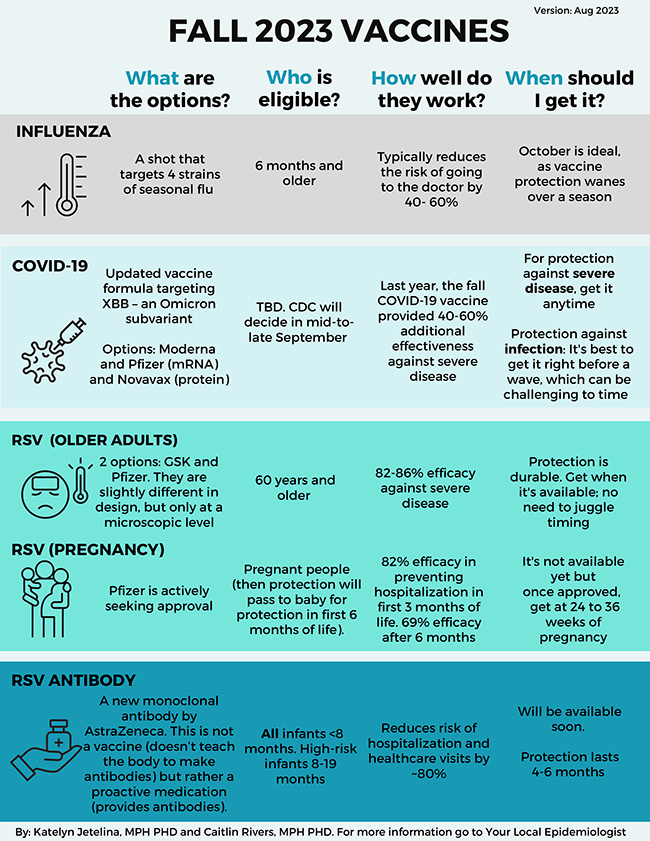Preventatively speaking: fall 2023 vaccine rundown
by Beth Donovan | Special to the Courier
It is time to get your annual flu shot. But what else? What about these other vaccines? Is the “triple threat” really coming this fall? Yes, it is. To what degree it will affect us is yet to be seen, but public health experts warn that we should be prepared.
The triple threat is influenza, Covid-19, and respiratory syncytial virus. Influenza and RSV tend to be seasonal and have been around long enough that we can predict patterns. Covid, despite not being at pandemic levels, is on the rise with a new variant and is expected to surge. As we head into the winter months, travel more, visit others more, send our kids back to school, and spend more time indoors together, these infections may spread more easily. The more people are immunized, the less chance of spread. Each is spread through the air with close contact, by sharing cups or toys, and may live on surfaces and inadvertently transmitted. Most importantly, they are all viruses which do not respond to treatment with antibiotics since that drug class can only treat bacterial infections.
And now, for the first time, you may be able to get vaccinated for all three of these!
Even if there are no complications, these infectious viral diseases can make you miss holiday events, travel, visits with loved ones, and make you feel just plain miserable. So, prevention is the key.
Especially in the fall and winter (but, really, just make it a habit), avoid contact with sick people whenever possible, don’t share utensils or masks, and wash your hands frequently and thoroughly.
Getting a vaccine may not always prevent the disease altogether, but it decreases the risk of severe disease, hospitalization, and death from the infection. Currently, the vaccines are manufactured individually. There is no all-in-one shot “triple threat” vaccine.
The influenza vaccine is no longer recommended just for high-risk individuals or certain age groups. We should all get one unless advised otherwise by a healthcare professional. Children older than six months who are getting vaccinated for the first time need two shots, each given one month apart. Older adults can get a special formulation which includes additional protection. If you have questions about why or whether to get a flu shot, please use a reputable source, like the CDC website, to dig a little deeper.
The RSV vaccine received FDA approval in August 2023. It is now recommended that adults 60 and older discuss the option of being vaccinated. We expect the vaccine to also be approved very soon for pregnant people, which would help protect newborns. A monoclonal antibody medication which was also recently approved should be given to our most vulnerable population to this infection, which is infants under 8 months old.
Finally, an updated Covid booster is right around the corner. Don’t confuse this new booster with the currently available booster the CDC is calling the updated Covid-19 vaccine. If you have not been vaccinated or are behind on getting your booster, it may be reasonable to get the updated vaccine that is available now. If you have received a booster already, you might want to wait for the new one. The new one (which I hope has a new name) is expected to be more effective at targeting the newest omicron subvariant.
If you are still confused, I don’t blame you! I like to refer to the guide developed by Katelyn Jetelina, M.P.H., Ph.D. and Caitlin Rivers, M.P.H., Ph.D., available at Dr. Jetelina’s blog at yourlocalepidemiologist.substack.com, where you can also get public health updates.
Claremont resident Beth Donovan, PA-C, practiced as a physician assistant for 20 years and served as chair of legislative affairs for the California Academy of Physician Assistants from 2004 to 2012. She is on the advisory board for Keck Graduate Institute’s Physician Assistant Program.




0 Comments